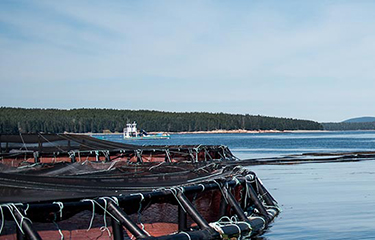The U.S. state of Washington terminated Cooke Aquaculture’s last two net-pen aquaculture leases in Puget Sound on 14 November, 2022.
The canceled leases are for a farm in Rich Passage off Bainbridge Island and off Hope Island in Skagit Bay, Washington. The current leases will formally expire 14 December, 2022 – after previously being granted one-month extensions – requiring Cooke to evacuate the site and conduct any necessary environmental remediation by that time. They are the last two farming sites still being operated by Saint John, New Brunswick, Canada-based Cooke, which has fought to maintain its commercial operations in Washington despite a statewide ban on non-native finfish aquaculture enacted after more than 260,000 Atlantic salmon escaped in August 2017 from a Cooke farm near Cypress Island, Washington.
“Since the catastrophic Cypress Island net-pen collapse in 2017, I have stood tall to defend the waters of Puget Sound,” Washington Commissioner of Public Lands Hilary Franz said in a press release. “This effort began by terminating finfish net-pen operations due to lease violations. Despite years of litigation – and a company that has fought us every step of the way – we are now able to deny lease renewals for the remaining net-pen sites. Today, we are returning our waters to wild fish and natural habitat. Today, we are freeing Puget Sound of enclosed cages. This is a critical step to support our waters, fishermen, tribes, and the native salmon that we are so ferociously fighting to save.”
Cooke had switched its remaining net-pens in Washington to farming steelhead, a native species, but had lost leases for several of the farming sites it had operated since its acquisitions of Icicle Seafoods in 2016. Cooke has challenged the termination of several of its leases and the litigation is still pending.
Franz said she plans on releasing an updated state plan for future aquaculture development in the state at 11 a.m. Friday, 18 November.
In a statement, Cooke Aquaculture said it was “very disappointed” in the state’s decision not to renew its leases, saying the immediacy of its effect will force it to kill 332,000 juvenile steelhead that it planned to stock at the two farms in 2023.
“Regulators and policymakers must responsibly follow the science and judicial precedents in making key decisions regarding marine aquaculture, which we do not believe was the case in this instance,” Cooke Aquaculture Vice President of Public Relations Joel Richardson said. “Over the past five years, Cooke has worked to foster productive working relationships with tribes, DNR staff, and other state agencies. A recent federal biological opinion and a recent Washington Supreme Court decision both reaffirm the state of the science that fish farming does not have an adverse impact on the environment. All of these factors are contrary to DNR’s decision to not renew our leases.”
Richardson pointed blame for the Cypress Island escape on Icicle’s alleged failure to perform adequate maintenance and upkeep on the farm.
“The compliance issues relied upon by DNR as the reason not to renew our two steelhead fish farming leases in Rich Passage and Hope Island stem from our assuming ownership of farms that fell into disrepair by the previous owner. After the collapse of that farm, Cooke focused on improving the operations in Washington, working with regulators to increase transparency of its operations, implementing third party engineering review of its facilities, implementing enhanced environmental monitoring, and transitioning the farms early to all female, sterile trout,” Richardson said. “DNR’s action ignores all of this effort and improvements. DNR’s own staff has repeatedly commended Cooke, in both internal and external correspondence, for the strides it had taken in working with DNR, the Washington Department of Ecology and WDFW. The actions by DNR’s leadership are perplexing at best, and punitive at worst. As a Canadian family company investing significantly in Washington state and creating local jobs, this is very disheartening. As a steward of Washington’s lands, DNR is sending a very clear message to others: ‘Do not come to Washington, do not invest here.’”
Richardson disputed Franz’s contention that Cooke’s operations threatened the environment.
“Environmental organizations and Commissioner Franz are choosing to ignore the fact that farm-raised fish is one of the healthiest and most efficient ways to feed the global population with a minimal environmental impact and the lowest carbon footprint of any animal protein. Farmers work closely with world-renowned scientists from academia, government, and the private sector to develop rigorous standards and implement best practices for fish health and environmental protection,” Richardson said. “The science does not support the statements made by Commissioner Franz that the removal of these fish farms will save wild fish and natural habitat. There are many known factors contributing to wild salmon population decline including hydropower dams, growing seal populations as predators, habitat loss due to development, continued commercial fishing in migratory routes, municipal waste treatment plants releasing untreated pollutants and contaminants which affect juvenile salmon and more. Fish farming can mitigate these harms by reducing pressures on wild stocks and also by directly applying the expertise of companies like Cooke to better hatchery and wild salmon recovery efforts.”
Photo courtesy of Cooke Aquaculture







